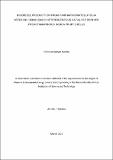| dc.description.abstract | Biodiesel is an alternative fuel to mineral diesel. It is produced from abundant and easily available renewable resources of animal fats and vegetable oil. However, the cost of oil feedstock is the major obstacle towards production and commercialization of biodiesel. In this study, an economical and environmental friendly heterogeneous catalyst derived from Tamarindus indica fruit shells (TIFSs) was prepared by calcination method, and it was used in transesterification of Parinari curatellifolia seeds oil (PCSO) to produce biodiesel. The seeds were characterized by having high oil content 36.2%, which makes the feedstock a reasonable candidate for biodiesl production.
The catalyst was prepared by calcination of TIFSs at 800 °C in muffle furnace for 3 hours to obtain Tamarindus indica fruit shells ash (TIFSA), a heterogeneous catalyst. Various techniques were used to analyze physicochemical properties of TIFSA. The catalyst exhibits high basic strength (pH>9.7), with the mesoporous structure of pore diameter d = 3.2 nm, high specific area 378.2 m2/g, pore volume of 0.203 cm3/g and CaO crystals as a major active phase of the catalyst. The calcinated catalyst TIFSA was tested in the production of biodiesel through transesterification process using PCSO to obtain Parinari curatellifolia methyl ester (PCUME). During production, the best operating parameters were 5% wt. catalyst loading, 2 hours reaction time and 9:1 methanol to oil molar ratio with the maximum yield of 96.2%. In addition, the catalyst was easily separated and reused again four more times with biodiesel yield above 74%.
Furthermore, the produced biodiesel was analyzed by Gas Chromatography-Mass Spectrometry (GC-MS) and composed mainly of unsaturated acids 63.6% and saturated acid 36.39%. Also, fuel properties of produced PCUME were investigated as per ASTM methods and compared to ASTM D6751 standard limits and mineral diesel. Most of the determined fuel properties were observed to be in good agreement with the global standards. Therefore, Parinari curatellifolia seeds oil and Tamarindus indica fruit shell are ideal feedstock for low-cost biodiesel and catalyst production respectively. | en_US |

